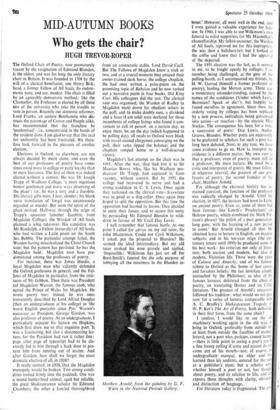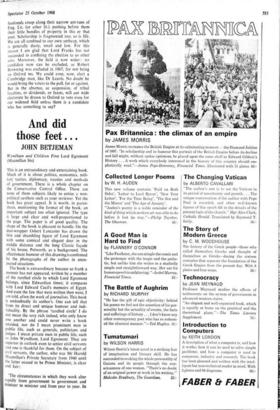Who gets the chair? MID-AUTUMN BOOKS
HUGH TREVOR-ROPER
The Oxford Chair of Poetry, now prematurely vacant by the resignation of Edmund Blunden, is the oldest, and was for long the only literary chair in Britain. It was founded in 1708 by the will of a clerical benefactor, one Henry Birk- head, a former Fellow of All Souls. Its endow- ments were, and are, modest. The chair is filled by an agreeably democratic method : like the Chancellor, the Professor is elected by all those MAS of the university who take the trouble to vote in person. Recently our domestic reformer, Lord Franks, an austere Benthamite who dis- trusts the patronage of Crown and People alike, has recommended that the franchise be 'modernised'—i.e., concentrated in the hands of the resident dons. I am glad to say that this zeal for uniformity has been frustrated. We there- fore look forward to the pleasure of another election.
Elections in Oxford, as elsewhere, are not always decided by merit alone, and even the best of our professors of poetry have some- times owed more to college or party loyalty than to mere literature. The first of them was indeed elected without a contest. He was Dr Joseph Trapp of Wadham College, 'a most ingenious honest gentleman and every ways deserving of the place': i.e., he was a tory and a Jacobite. His literary gifts were, I fear, slender : his blank verse translation of Vergil was unanimously regarded as murder. But soon the spirit of the place revived. Half-way through the reign of Trapp's successor (another Jacobite, from Magdalen College), the Warden of All Souls planned a whig take-over. His candidate was Mr Randolph, a Fellow (naturally) of All Souls, who had written a Latin poem on the South Sea Bubble. The particular attempt failed, the Warden having miscalculated the Christ Church vote; but the pattern has persisted. So has the Magdalen hold : Magdalen men have pre- dominated among the professors of poetry.
For instance, there was James Hurdis, a loyal Magdalen man who valiantly defended the Oxford professors in general, and the Fel- lows of Magdalen in particular, from the stric- tures of Mr Gibbon. Then there was President (of Magdalen) Warren, the famous snob, who netted the Prince of Wales for Magdalen. He wrote poetry too : indeed, he was once irreverently described by Lord Alfred Douglas (then an undergraduate at his college) as 'the worst English poetaster since Pye.' Warren's successor as President, George Gordon, was also professor of poetry. As an undergraduate, I particularly enjoyed his lecture on Hopkins, which first drew me to that exquisite poet.(It was a fascinating, but also a disconcerting lec- ture, for the President had run it rather fine: page after page of typescript had to be dis- creetly fed to him through a back door to pre- vent him from running out of matter. And after Gordon, how shall we forget the most dramatic election of all, in 1938?
It really seemed, in 1938, that the Magdalen monopoly would be broken. Two strong candi- dates trotted firmly into the paddock. One was a sound hunter-bred animal, aged but reliable, the great Shakespearean scholar Sir Edmund Chambers; the other a fancied thoroughbred from an aristocratic stable, Lord David Cecil. But The Fellows of Magdalen knew a trick or two, and at a crucial moment they entered their owner-trained dark horse, the college chaplain. He had once written a prize-poem on the promising topic of Babylon and he now rushed out a narrative poem in four books, Old King Coel. His colleagues did the rest. The clerical vote was organised; the Warden of Radley (a Magdalen man) drove his obedient ushers to the poll; and to make doubly sure, a dividend and a feast (I am told) were declared for those incumbents of college livings who found it con- venient to call iri person on a certain day, to enjoy them. So, on the day (which happened to be polling day), all roads to Oxford were black with travel-stained clergymen converging on the poll; their votes tipped the balance; and the chaplain romped home to a well-deserved victory.
Magdalen's last attempt on the chair was in 1951. After the war, they had lost it to Sir Maurice Bowra who, like his Wadham pre- decessor Dr Trapp, had captured it, from vacancy, without contest. But by. 1951 the college had recovered its nerve and had a strong candidate in C. S. Lewis. Once again they reckoned on the clerical vote—Screwtape was as good as a dog-collar. Once again they hoped to split the opposition. But this time the opposition had learned its lesson. They decided to unite their forces, and to secure this unity by persuading Mr Edmund Blunden to with- draw in favour of Mr Cecil Day Lewis.
I- well remember that famous battle. At one point I called for advice on my old tutor, Sir John Masterman. Could not Cyril Wilkinson, I asked, put the proposal to Blunden? He seemed the ideal intermediary. But my old tutor stroked his nose gravely and replied, `Impossible : Wilkinson has just set off for Brett-Smith's funeral for the sole purpose of lobbying all the mourners in the Blunden in- Matthew Arnold, from the painting by G. F. Watts in the National Portrait Gallery. terest.' However, all went well in the end, and `I even gained a valuable experience for later use. In 1960, I was able to use Wilkinson's own funeral to enlist supporters for Mr Macmillan's chancellorship. My fellow-mourner, the Warden of All Souls, reproved me for this impropriety (he was then a Salisburyite); but I looked at the coffin and knew that I had the approval of the departed.
The 1951 election was the last, as it seemed to me, to be fought openly by colleges. I re- member being challenged, at the gate of the polling-booth, as I accompanied my friends, by H. W. Garrod (himself a former professor of poetry), leading the Merton army. There was a momentary misunderstanding, caused by the names of the candidates (`Under which Lewis, Bezonian? Speak or diet'); but happily eve found ourselves in agreement. Since then, the orderly voting by colleges has been replaced by a new process, individuals being galvanised into action—or reaction—by the electric Miss Starkie. The consequence has been for a time a succession of poets : Day Lewis, Auden.
Graves, Blunden. Whether poets are necessarily to be preferred to scholars for such a post has long been debated. Now, at any rate, we hale some evidence to go on. How to interpret the evidence is a different matter. My own view is that a professor, even of poetry, must still be a professor. He must lecture. He must be a critic and interpreter of poetry. He must follcm at whatever interval, the greatest of our pro- fessors of poetry, the second founder of the chair, Matthew Arnold.
For although the electoral history has re- mained constant, the function of the professor was radically changed by Arnold. Until his election, in 1857, the lectures had been in Latin. on ancient poetry. Even so, some of them had been famous—like Lowth's Praelections' on Hebrew poetry, which combined (in Mark Pat- tison's phrase) 'the polish of a past generation.
long gone, with the learning of a new period to come.' But Arnold changed all that. He obtained leave to lecture in English, on modern subjects; and in his ten-year reign (the cus- tomary tenure until 1895) he produced some of his best work : his criticism not only of litera- ture, both ancient and modern, but also of modern, Victorian life. Those were the years of Culture and Anarchy, and of his famous tribute to Oxford as the 'home of lost causes and forsaken beliefs,' the last inviolate citadel, untouched by the Philistines; as also of his famous lectures, delivered from the chair of poetry, on translating Homer and on Celtic literature. The greatest of Arnold's successors followed his tradition: what would we not give now for a series of lectures comparable with A. C. Bradley's Shakespearean Tragedy or W. P. Ker's The Art of Poetry, both delivered, in their first form, from the same chair?
I confess, I would like to see the old machinery working again in the old way, to bring to Oxford, preferably from outside (or at least from outside the faculties of modern letters), not a poet who,.perhaps, cannot lecture —there is little point in seeing a poet's eye in a fine frenzy rolling if sense and reason do nel come out of his mouth—nor, of course, an undergraduate manqué, no older and less learned than his auditors, entered for the race as a publisher's stunt, but a scholar who, whether himself a poet or not, has though! about poetry, and its relation to life, and car express those thoughts with clarity, elevation and distinction of language. For literature today is fragmented. The pro. fessionals creep along their narrow ant-runs of Eng. Lit. (or other lit.), pushing before them their little bundles of property in this or that poet. Scholarship is fragmented too; so is life. We are all confined to our own antheap, which is generally dusty, small and low. For this reason I am glad that Lord Franks has not succeeded in confining the election to us other ants. Moreover, the field is now wider: no candidate now can be excluded, as Robert Browning was excluded in 1867, for not being an Oxford ma. We could even, now, elect a Cambridge man, like Dr Leavis. No doubt he would bring the voters to the poll, for or against. But in the absence, or suspension, of tribal loyalties, or dividends, or feasts, will our wide electorate be drawn to Oxford to vote even for our widened field unless there is a candidate who has something to say?















































 Previous page
Previous page